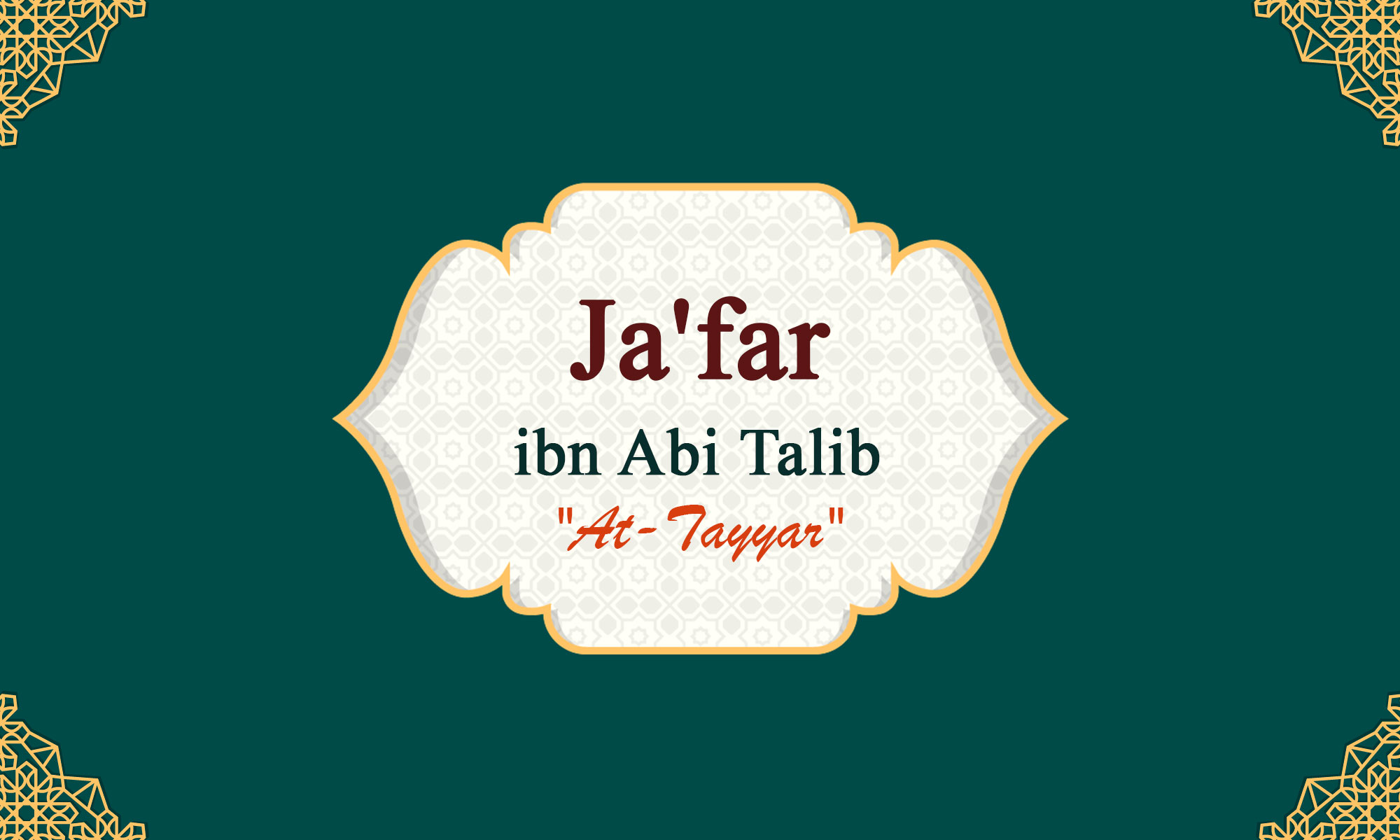Ja'far ibn Abi Talib "Cousin of the Prophet"

Ja'far ibn Abi Talib, one of the cousins of Prophet Muhammad ﷺ and one of the early converts to Islam, was known as "Abu al-Masakin" (Father of the Poor) due to his compassion towards the needy. He led the Muslim migration to Abyssinia and served as a successful envoy of Islam to Negus, the king of Abyssinia.
Ja'far was martyred in the Battle of Mu'tah, where he lost both hands while carrying the Muslim banner. The Prophet ﷺ honored him with the title "At-Tayyar" (The Flyer), promising him wings in Paradise. This article explores his lineage, conversion to Islam, migration, heroism, and martyrdom, highlighting his crucial role in spreading Islam.
Lineage and Family of Ja'far ibn Abi Talib
Ja'far ibn Abi Talib, also known as Abu Abdullah, was from the noble Quraysh tribe and a Hashimite by descent. His full lineage is Ja'far ibn Abi Talib ibn Abd al-Muttalib ibn Hashim ibn Abd Manaf ibn Qusay.
The Prophet ﷺ gave him the title Abu al-Masakin because of his deep concern for the poor. He was born in Mecca 36 years before the Hijra and bore a strong resemblance to Prophet Muhammad ﷺ in both appearance and character.
Ja'far was married to Asma' bint Umays, a distinguished companion of the Prophet. After Ja'far's martyrdom, she married Abu Bakr Al-Siddiq (RA) and bore him Muhammad ibn Abi Bakr.
Ja'far had three sons: Abdullah, Muhammad, and Awn. His son Abdullah ibn Ja'far became one of the most generous men in Islam. Among Arabs, Hatim al-Tai was known for generosity in pre-Islamic times, while Abdullah ibn Ja'far was renowned for generosity in Islam.
Conversion to Islam
Ja'far embraced Islam in its early days, even before Prophet Muhammad ﷺ established Dar Al-Arqam as a center for preaching. He was among the first to accept Islam, converting shortly after his brother Ali ibn Abi Talib (RA).
Migration to Abyssinia
Ja'far led the Muslim migrants to Abyssinia, where he served as an excellent ambassador of Islam. When Amr ibn al-As, a Quraysh emissary, attempted to convince Negus (the king of Abyssinia) to surrender the Muslim refugees, Ja'far delivered a powerful speech explaining Islam’s principles.
His words deeply moved Negus, leading him to reject Amr’s request and grant Muslims protection. This encounter was a turning point, as it influenced Negus’s openness to Islam.
Ja'far ibn Abi Talib and Negus of Abyssinia
One of the most remarkable historical moments was Ja'far’s debate with Negus, a dialogue that shaped Abyssinia’s stance on Islam.
As Muslims sought refuge from Quraysh persecution, Amr ibn al-As tried to persuade Negus to expel them by offering lavish gifts.
Ja'far, armed only with the truth, delivered a compelling speech about Islam’s values of justice, monotheism, and moral transformation. He said:
"O King, we were a people of ignorance - worshipping idols, consuming carrion, committing shameful acts, and severing family ties. Then, Allah sent us a Messenger who called us to truth and righteousness”.
Negus, deeply moved, rejected Amr ibn al-As's request and granted Muslims safety in Abyssinia. This event demonstrated the power of honest dialogue and faith-driven diplomacy.
Participation in the Battle of Mu'tah and Martyrdom
Ja'far returned from Abyssinia to Medina in the 7th year of Hijra, shortly after the Battle of Khaybar. Prophet Muhammad ﷺ rejoiced at both the victory of Khaybar and Ja'far’s return, saying:
"I do not know which pleases me more - Khaybar’s conquest or Ja'far’s return!"
The Battle of Mu'tah and Ja'far’s Martyrdom
In 8 AH, the Prophet ﷺ sent an army to confront the Byzantine forces, marking Islam’s first military engagement with the Romans. The Prophet appointed three successive commanders:
- Zayd ibn Harithah
- Ja'far ibn Abi Talib (if Zayd was martyred)
- Abdullah ibn Rawahah (if Ja'far was martyred)
All three commanders were martyred in succession, exactly as the Prophet ﷺ had foreseen.
Ja'far took the Muslim banner after Zayd’s martyrdom. As he fought, he became the primary target, since a fallen banner could demoralize an army.
- When his right hand was severed, he held the flag with his left.
- When his left hand was cut, he held it between his arms.
- He continued fighting until he fell as a martyr, receiving over 90 wounds from swords, spears, and arrows.
The Title "At-Tayyar" (The Flyer) – Its Meaning
After Ja'far’s martyrdom, Prophet Muhammad ﷺ gave him the title "At-Tayyar" (The Flyer), saying:
"I saw Ja'far ibn Abi Talib in Paradise, flying with angels, with two wings in place of his severed hands”. [Reported by Al-Suyuti (Hadith No. 4367), Al-Tirmidhi (Hadith No. 3763), and Al-Hakim (Hadith No. 4890)]
Upon the army’s return, the Prophet ﷺ gathered Ja'far’s children, embraced them, and wept. He ordered their heads to be shaved as a sign of care and protection.
Lady Aisha (RA) narrated:
"When Ja'far was martyred, we saw deep sorrow on the Prophet’s face”.